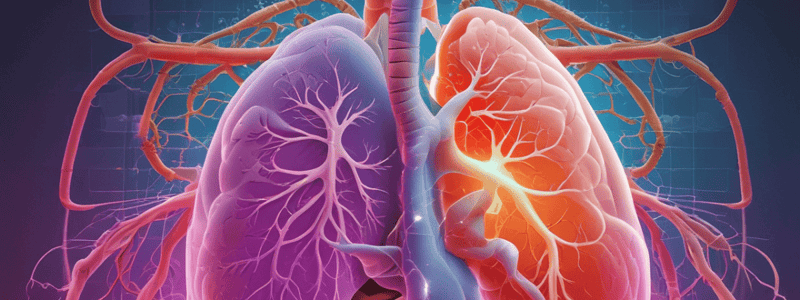Podcast
Questions and Answers
What is the function of a spirometer?
What is the function of a spirometer?
- Monitor brain activity
- Measure lung volumes and capacities (correct)
- Assess heart rate
- Analyze blood oxygen levels
Which lung function test is related to time?
Which lung function test is related to time?
- Peak Expiratory Flow Rate (PEFR) (correct)
- Tidal volume
- Inspiratory reserve volume
- Residual volume
What is the purpose of lung function tests?
What is the purpose of lung function tests?
- Monitor kidney function
- Measure heart function
- Evaluate liver health
- Assess efficiency of breathing mechanism (correct)
Which lung volume is NOT measured using a spirometer?
Which lung volume is NOT measured using a spirometer?
What is the purpose of Forced Vital Capacity (FVC) test?
What is the purpose of Forced Vital Capacity (FVC) test?
Which lung capacity represents the total amount of air the lungs can hold?
Which lung capacity represents the total amount of air the lungs can hold?
What is the normal value for Vital Capacity (VC)?
What is the normal value for Vital Capacity (VC)?
Which lung volume is increased in old age and in obstructive lung diseases like emphysema?
Which lung volume is increased in old age and in obstructive lung diseases like emphysema?
What is the method used to measure Residual Volume (RV)?
What is the method used to measure Residual Volume (RV)?
What is the normal value for Inspiratory Capacity (IC)?
What is the normal value for Inspiratory Capacity (IC)?
Which lung capacity is the sum of Tidal Volume (TV), Inspiratory Reserve Volume (IRV), and Expiratory Reserve Volume (ERV)?
Which lung capacity is the sum of Tidal Volume (TV), Inspiratory Reserve Volume (IRV), and Expiratory Reserve Volume (ERV)?
What is the normal value for Tidal Volume (TV)?
What is the normal value for Tidal Volume (TV)?
Which lung capacity is the sum of Residual Volume (RV) and Expiratory Reserve Volume (ERV)?
Which lung capacity is the sum of Residual Volume (RV) and Expiratory Reserve Volume (ERV)?
What is the normal value for Expiratory Reserve Volume (ERV)?
What is the normal value for Expiratory Reserve Volume (ERV)?
What is the normal value for functional residual capacity (FRC)?
What is the normal value for functional residual capacity (FRC)?
What is the significance of functional residual capacity (FRC)?
What is the significance of functional residual capacity (FRC)?
In which conditions is the functional residual capacity (FRC) increased?
In which conditions is the functional residual capacity (FRC) increased?
In which conditions is the functional residual capacity (FRC) decreased?
In which conditions is the functional residual capacity (FRC) decreased?
What is the normal value for total lung capacity (TLC)?
What is the normal value for total lung capacity (TLC)?
Which of the following lung volumes and capacities are not measured completely by a spirometer?
Which of the following lung volumes and capacities are not measured completely by a spirometer?
What is the difference between forced vital capacity (FVC) and vital capacity (VC)?
What is the difference between forced vital capacity (FVC) and vital capacity (VC)?
What percentage of the forced vital capacity (FVC) can be exhaled in the majority of cases?
What percentage of the forced vital capacity (FVC) can be exhaled in the majority of cases?
How do lung volumes and capacities generally differ between men and women?
How do lung volumes and capacities generally differ between men and women?



